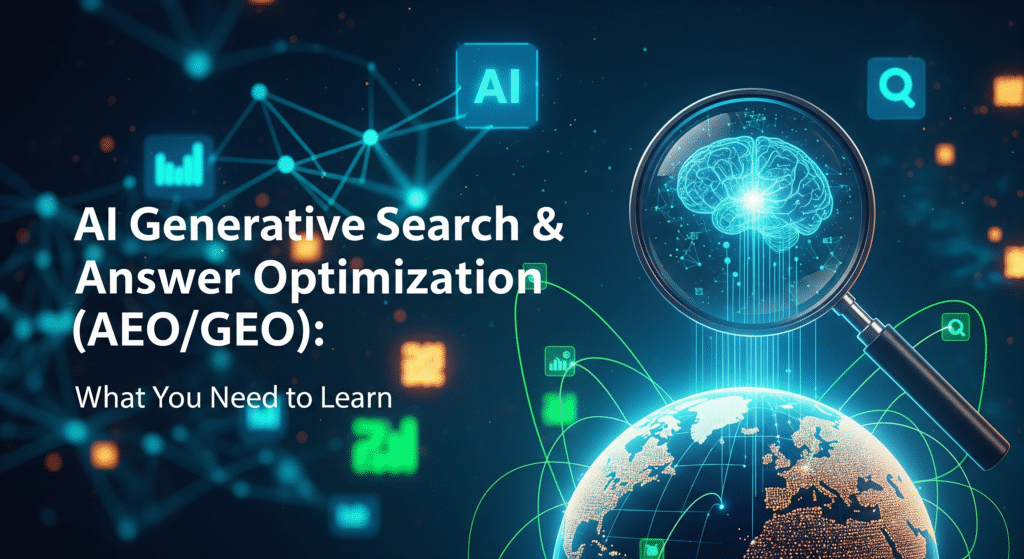Search is changing. It’s still not enough to do the old SEO such as targeting keywords, building links, and optimizing metadata. With the advent of AI powered search tools such as Google’s Search Generative Experience(SGE,) Bing AI, Gemini, ChatGPT, Perplexity, etc., people expect both fast, reliable, direct answers. Generative Search & Answer Engine Optimization (AEO or GEO) is what allows websites to remain readily seen in this new landscape.
If your content doesn’t conform to what these AI/search engines want, you may be buried even if your classic search rank is good. Now, the name of the game is to be one of where the tools pull the answers. It means your content needs to be well-organized, authoritative, easy to understand, up-to-date, and highly relevant.
How to Adapt Your Content?
- Start by creating a brief summary or “definition” for the top of your page.
- Leverage tables, bullets, and numbers to cut through complex ideas.
- Introduce a FAQ section with ‘softball’ questions + direct answers.
- Include reference studies, reliable data, quotes or actual examples.
- Utilize schema markup (FAQ, Q&A, How‑To, etc.).
- Track what surfaces in AI Overviews for your desired keywords, reverse-engineer what those examples get right.
Crucial Components of Generative Search Optimization
The important components of the generative search optimization are as follows:
- Intent over keywords: It means what people actually mean when they search. But we should relieve our obsession with actionable search and focus on pithy conversational queries, use context, anticipate follow-up questions.
- Semantic content & entity SEO: Employ synonyms and related terms, and ensure the content addresses related subtopic. E.g. “answer engine optimization,” “generative engine optimization,” “AI SERP visibility,” “AI search,” “AI‑powered answers.”
- Short direct answers + formatted content: Make use of headings (H2, H3) to mimic questions (e.g. “How to do X?, “What is Y?”). Give bullet points, tables, definitions right off the bat.
- Authoritative sources: Citing. gov,. edu, high‑authority sites. Add quotes from experts, data from previous reporting, citations.
- Optimize for “featured snippets” / AI Overviews: The answer boxes above regular results. Utilize Q&A sections, FAQ schema, “definition” sections.
Why This Matters Now?
Search engines are increasingly relying on AI and LLMs to provide fast, trustworthy answers. They’re often getting their answers in search results directly, or using chat/AI interfaces, without clicking through. If your content doesn’t adhere to the formats or signals those systems are looking for, you can lose exposure and traffic, even if your rankings are great.
Additionally, there are a lot of competitor sites already targeting generative AI. For those who don’t, you could run the risk of falling behind. The sooner you optimize, the higher your odds of being chosen for an answer source, a featured snippet or an AI summary.
The Final Thoughts
The future of GAEO is here now Generative Search and Answer Engine Optimization (AEO) is not merely a future trend, it already represents your present-day digital visibility.
The development of AI-based tools will influence how people receive information and making content that is clear, well-structured and made with intent in mind will be crucial. When you develop and optimize your pages for direct answers, conversational queries and trust signals, you enable your site to remain competitive in AI-based search. Begin now, because the sites that get with the program today will own the future.
FAQs
1. What is generative SEO (GSEO)?
Generative search engine optimization is content developed specifically for consumption and interpretation by AI/Answer Engines such as ChatGPT, Google SGE, Gemini, and so on – optimized for quick answers that have high authority.
2. What sets AEO apart from classic SEO?
Classical SEO targets ranking for keywords and back-linking; AEO aspirations for being selected as a direct answer in AI/answer engine result pages via structured content and intent matching.
3. What medium of content suits an AI Overview the most?
Brief definition sections, FAQs, bullet points, tables, and heading that end in question words such as content that provides short, easy answers.
4. How can I research for generative search keywords?
Focus on conversational keywords or long‑tail queries, utilize the likes of AnswerThePublic and keyword research tools, and spend time looking at “People Also Ask” and AI Answer boxes in your competitor’s search snippets.
5. Do updates and freshness impact GEO ranking?
Yes. AI prefers content as current as possible. Citizen science ensures that data, facts, and quotes are constantly being updated and a tightly managed database is a matter of trust and visibility.




